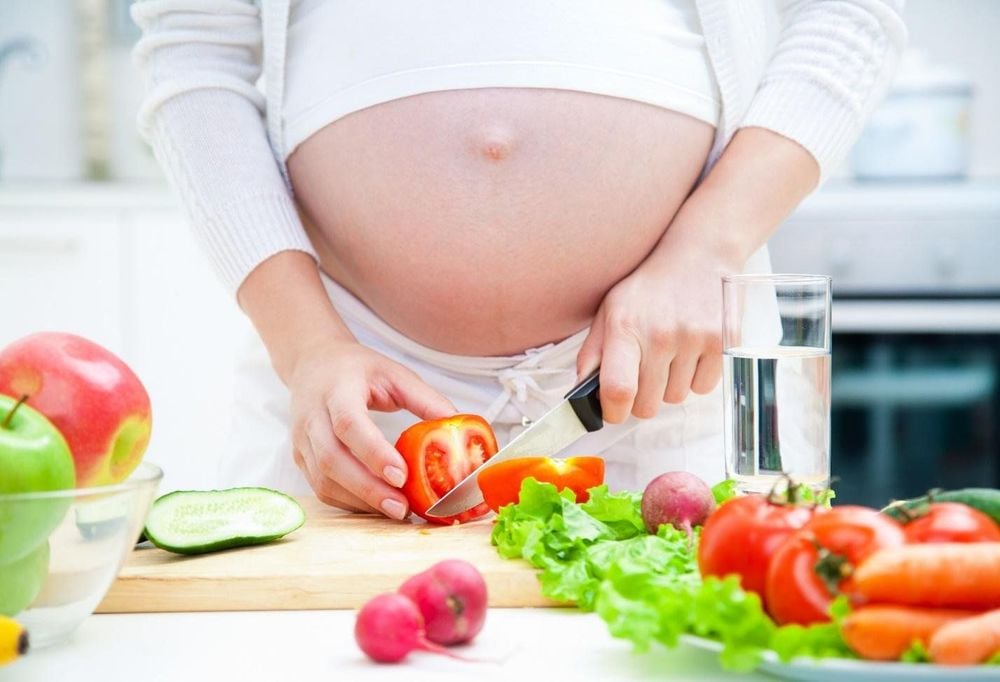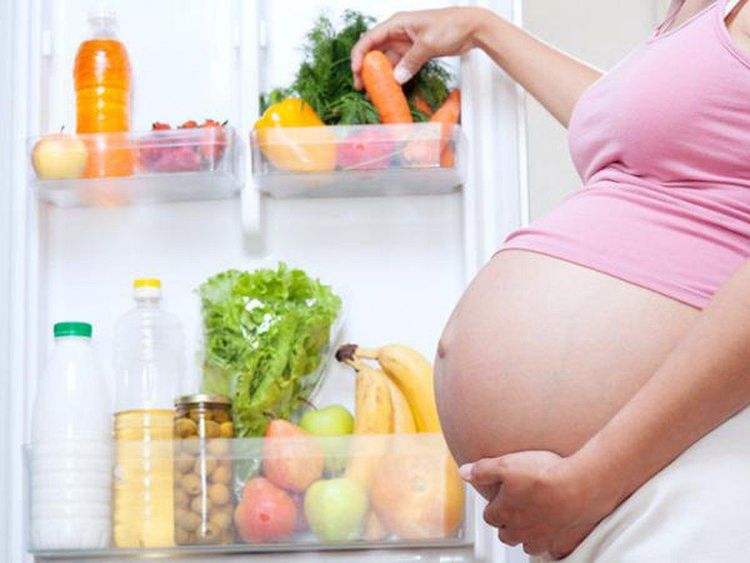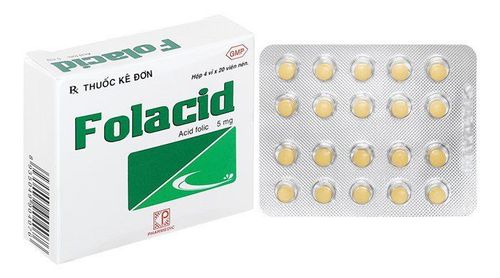This is an automatically translated article.
The article was professionally consulted by Specialist II Lai Thi Nguyet Hang - Obstetrician and Gynecologist - Department of Obstetrics and Gynecology - Vinmec Ha Long International HospitalDuring more than 9 months in the mother's womb, the fetus lives and develops based on direct nutrition from the mother. Therefore, if the mother has enough nutrients, the baby will also be healthy and develop comprehensively.
Nutrition for pregnant women during pregnancy will need to be fully provided with the following main groups:
1. Key nutrients and energy
The average energy required for a woman is 2,200 kcal/day, during the second trimester of pregnancy, the amount of energy required increases by 360kcal/day. In the last 3 months is the time to accelerate the development of the fetus, pregnant women need an extra 475kcal/day, ensuring energy for the baby to grow and gain weight in the last part of pregnancy. Corresponding to the amount of energy intake, the corresponding rate of weight gain of the fetus which is 0.4 kg / week in the second and third months of pregnancy, for women of normal weight before pregnancy gain 0.5kg/week for low-weight women and 0.3kg/week for overweight women.The main nutrients need to be properly supplemented through meals such as protein to help build the fetus, placenta, mother's body tissue, or fat to build cell membranes, nervous system for the fetus , provide energy and help absorb vitamins in the oil for the mother. To supplement protein, pregnant women should eat protein-rich foods such as meat, fish, eggs, milk, and legumes. For fat, pregnant women should add both saturated and unsaturated fats, but with saturated fat should not use more than 10% of the daily dietary energy, increase the use of vegetable oils instead of animal oils.

2. Minerals and vitamins
Some essential minerals and vitamins in the diet for pregnant women need to be fully supplemented to ensure the comprehensive development of the fetus.Calcium is needed for the formation of bones and teeth for the fetus. Pregnant women need to add calcium-rich foods such as milk, fish, beans, green vegetables, especially dairy products such as yogurt, cheese, ice cream, which provide a very good source of calcium. The norm of calcium for pregnant women to supplement is 300mg/day to reach 1000mg/day Folic acid is needed for the normal development of the body. Folic acid is abundant in leafy vegetables, cabbage, asparagus, broccoli and white, oranges, bananas, eggs. Pregnant women need a higher amount of folic acid than the average person, 600 μg / day. In addition to oral supplements, pregnant women can use folic acid tablets. Folic acid supplementation should be done early when pregnancy is detected and continuously until the 12th week. If pregnant women do not provide enough folic acid, they are prone to macrocytic anemia, causing neural tube defects in the fetus. Vitamin A helps the development of the fetus and increases the mother's resistance. Pregnant women need to supplement with enough 800 μg/day of vitamin A and should not supplement too much, which can easily lead to teratogens. Vitamin A is abundant in foods of animal origin such as liver, egg yolks, butter, milk, meat, green, yellow, red vegetables... Vitamin D is necessary for the absorption of calcium and phosphorus. , the same structure to form bones for the fetus. Not providing enough vitamin D causes osteomalacia, convulsions due to hypocalcemia, early osteoporosis... Pregnant mothers can absorb vitamin D by synthesizing vitamin D in the skin under the influence of sunlight in the morning. Breakfast or eat a lot of cod liver, eggs, dairy, fatty fish rich in vitamin D. Vitamin B1 found in rice is not too white, beans, pork, mold products, hygienic yeast, a number of fish. Pregnant women need enough vitamin B1 to prevent edema during and after pregnancy.

3. Micronutrients
Iron deficiency for both mother and fetus during pregnancy. Pregnant women need to supplement iron with foods of animal origin such as meat and liver, which contain relatively high amounts of iron and are easily absorbed. Another very important source of iron is processed foods such as: nutritional powder, flour, instant noodles, fish sauce. Pregnant women can take iron tablets according to the doctor's prescription for the necessary amount, depending on their iron deficiency.Iodine has an important role for pregnant women. Some foods rich in iodine pregnant women should add in their daily meals are sea fish, seaweed, table salt... to meet the amount of iodine 200μg/day. Without enough iodine, it will affect the development of the fetus. Iodine-deficient pregnant women have a high risk of miscarriage, stillbirth, premature birth, or babies born with mental retardation due to brain damage, low birth weight, and birth defects such as paralysis of the limbs. deafness, strabismus, lisp... Even iodine deficiency during pregnancy leads to increased perinatal mortality. Therefore, pregnant women need to pay attention to supplement.
The correct nutritional supplement not only ensures the comprehensive development of the fetus but also helps the pregnant mother not to gain too much weight. Most of the nutrients in the body will be distributed to the mother and the baby, ensuring that the child develops without the mother gaining weight.
4. Some health issues pregnant women need to pay attention to

Anemia, iron deficiency often occurs in the second and third trimesters of pregnancy. Take an iron supplement with 60mg elemental iron and 400 μg folic acid. Taking 1 tablet per day continuously from the time of pregnancy until 1 month after giving birth is the best solution for pregnant women. Indigestion: Due to the pressure of the uterus on the digestive system, it is necessary to divide meals, do not eat full before going to bed, eat slowly and sit upright when eating. Constipation: Happens in about 30-40% of pregnant women, pregnant women should drink plenty of water (8 glasses/day), eat foods high in fiber. Vomiting: Usually occurs at 6-16 weeks. Pregnant women should avoid smelly foods, use foods high in sugar and low in fat. Wake up early in the morning, drink a glass of hot water with bread and cookies. So with the above information about nutrition and menu for pregnant women, I hope that pregnant women will have a healthy and developing pregnancy. For more specific advice, pregnant women can seek advice from nutritionists and obstetricians and gynecologists. At Vinmec International General Hospital, there is a package of Maternity services, which protects the health of mother and baby during pregnancy - labor and postpartum. When registering for the Maternity Package, pregnant women are examined and monitored for pregnancy by experienced doctors and specialists in Obstetrics and Gynecology, and are able to perform all necessary tests and ultrasounds during pregnancy for monitoring. baby's development as well as mother's health, experience of "painless birth" and comprehensive and thoughtful postpartum care program.
Please dial HOTLINE for more information or register for an appointment HERE. Download MyVinmec app to make appointments faster and to manage your bookings easily.














